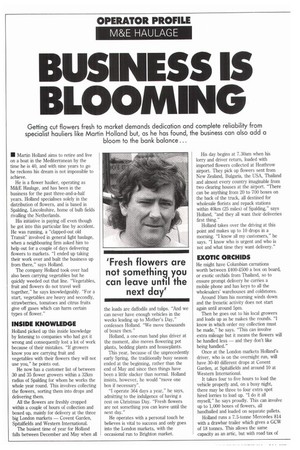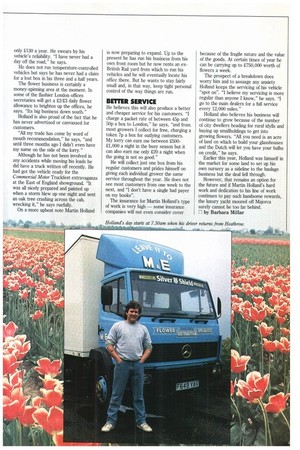BUSINESS IS BLOOMING
Page 52

Page 53

If you've noticed an error in this article please click here to report it so we can fix it.
Getting cut flowers fresh to market demands dedication and complete reliability from specialist hauliers like Martin Holland but, as he has found, the business can also add a bloom to the bank balance ...
• Martin Holland aims to retire and live on a boat in the Mediterranean by the time he is 40, and with nine years to go he reckons his dream is not impossible to achieve.
He is a flower haulier, operating as M&E Haulage, and has been in the business for the past three-and-a-half years. Holland specialises solely in the distribution of flowers, and is based in Spalding, Lincolnshire, home of bulb fields rivalling the Netherlands.
His initiative is paying off even though he got into this particular line by accident. He was running, a "clapped-out old Transit" involved in general light haulage, when a neighbouring firm asked him to help out for a couple of days delivering flowers to markets. "I ended up taking their work over and built the business up from there," says Holland.
The company Holland took over had also been carrying vegetables but he quickly weeded out that line. "Vegetables, fruit and flowers do not travel well together," he says knowledgeably. "For a start, vegetables are heavy and secondly, strawberries, tomatoes and citrus fruits give off gases which can harm certain types of flower."
INSIDE KNOWLEDGE
Holland picked up this inside knowledge by listening to companies who had got it wrong and consequently lost a lot of work because of their mistakes. "If growers know you are carrying fruit and vegetables with their flowers they will not use you," he points out.
He now has a customer list of between. 30 and 35 flower growers within a 32km radius of Spalding for whom he works the whole year round. This involves collecting the flowers, sorting them into drops and delivering them.
All the flowers are freshly cropped within a couple of hours of collection and boxed up, mainly for delivery at the three big London markets — Covent Garden, Spitalfields and Western International.
The busiest time of year for Holland falls between December and May when all the loads are daffodils and tulips. "And we can never have enough vehicles in the weeks leading up to Mother's Day," confesses Holland. "We move thousands of boxes then."
Holland, a one-man band plus driver at the moment, also moves flowering pot plants, bedding plants and houseplants.
This year, because of the unprecedently early Spring, the traditionally busy season ended at the beginning, rather than the end of May and since then things have been a little slacker than normal. Holland insists, however, he would "move one box if necessary".
"I operate 364 days a year," he says, admitting to the indulgence of having a rest on Christmas Day. "Fresh flowers are not something you can leave until the next day."
He operates with a personal touch he believes is vital to success and only goes into the London markets, with the occasional run to Brighton market. His day begins at 7.30am when his lorry and driver return, loaded with imported flowers collected at Heathrow airport. They pick up flowers sent from New Zealand, Bulgaria, the USA, Thailand and almost every country imaginable from two clearing houses at the airport. "There can be anything from 20 to 700 boxes on the back of the truck, all destined for wholesale florists and repack stations within 40km (25 miles) of Spalding," says Holland, "and they all want their deliveries first thing."
Holland takes over the driving at this point and makes up to 10 drops in a morning. "I know all my customers," he says. "I know who is urgent and who is not and what time they want delivery."
EXOTIC ORCHIDS
He might have Columbian carnations worth between £400-E500 a box on board, or exotic orchids from Thailand, so to ensure prompt delivery he carries a mobile phone and has keys to all the wholesalers' warehouses and coldstores.
Around 10am his morning winds down and the frenetic activity does not start again until around 5pm.
Then he goes out to his local growers and loads up as he makes the rounds. "I know in which order my collection must be made," he says. "This can involve extra mileage but it means the flowers will be handled less — and they don't like being handled."
Once at the London markets Holland's driver, who is on the overnight run, will have 30-40 different drops at Covent Garden, at Spitalfields and around 10 at Western International.
It takes four to five hours to load the vehicle properly and, on a busy night, there may be three to four extra spot hired lorries to load up. "I do it all myself," he says proudly. This can involve up to 1,000 boxes of flowers, all handballed and loaded on separate pallets.
Holland runs a 7.5-tonne Mercedes 814 with a drawbar trailer which gives a GCW of 18 tonnes. This allows the same capacity as an artic, but with road tax of
only £130 a year. He swears by his vehicle's reliability. "I have never had a day off the road," he says.
He does not run temperature-controlled vehicles but says he has never had a claim for a lost box in his three and a half years.
The flower business is certainly a money-spinning area at the moment. In some of the flashier London offices secretaries will get a £2/£3 daily flower allowance to brighten up the offices, he says. "Its big business down south."
Holland is also proud of the fact that he has never advertised or canvassed for customers.
"Al! my trade has come by word of mouth recommendation," he says, "and until three months ago I didn't even have my name on the side of the lorry."
Although he has not been involved in any accidents while moving his loads he did have a truck written off recently. He had got the vehicle ready for the Commercial Motor Truckfest extravaganza at the East of England showground. "It was all nicely prepared and painted up when a storm blew up one night and sent an oak tree crashing across the cab, wrecking it," he says ruefully.
On a more upbeat note Martin Holland is now preparing to expand. Up to the present he has run his business from his own front room but he now rents an exBritish Rail yard from which to run his vehicles and he will eventually locate his office there. But he wants to stay fairly small and, in that way, keep tight personal control of the way things are run.
REITER SERVICE
He believes this will also produce a better and cheaper service for his customers. "I charge a packet rate of between 45p and 50p a box to London," he says, "and from most growers I collect for free, charging a token 7p a box for outlying customers. My lorry can earn me between £500£1,000 a night in the busy season but it can also earn me only £20 a night when the going is not so good."
He will collect just one box from his regular customers and prides himself on giving each individual grower the same service throughout the year. He does not see most customers from one week to the next, and "I don't have a single bad payer on my books".
The insurance for Martin Holland's type of work is very high — some insurance companies will not even consider cover because of the fragile nature and the value of the goods. At certain times of year he can be carrying up to £750,000 worth of flowers a week.
The prospect of a breakdown does worry him and to assuage any anxiety Holland keeps the servicing of his vehicle "spot on". "I believe my servicing is more regular than anyone I know," he says. "I go to the main dealers for a full service every 12,000 miles."
Holland also believes his business will continue to grow because of the number of city dwellers heading for rural idylls and buying up smallholdings to get into growing flowers. "All you need is an acre of land on which to build your glasshouses and the Dutch will let you have your bulbs on credit," he says.
Earlier this year, Holland was himself in the market for some land to set up his own nursery as a sideline to the haulage business but the deal fell through.
However, that remains an option for the future and if Martin Holland's hard work and dedication to his line of work continues to pay such handsome rewards, the luxury yacht moored off Majorca surely cannot be too far behind.
El by Barbara Millar




















































































































































